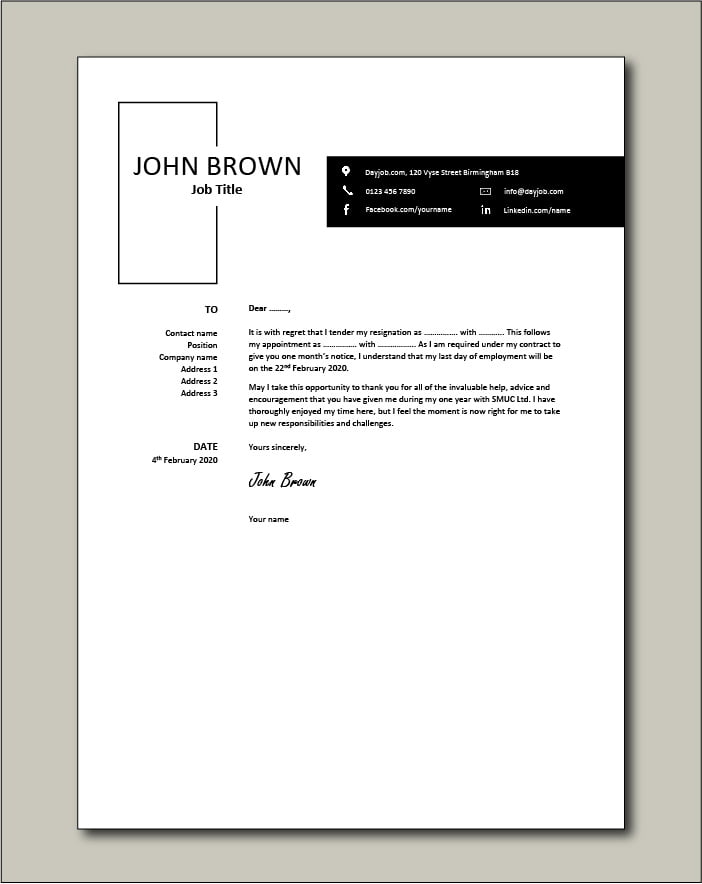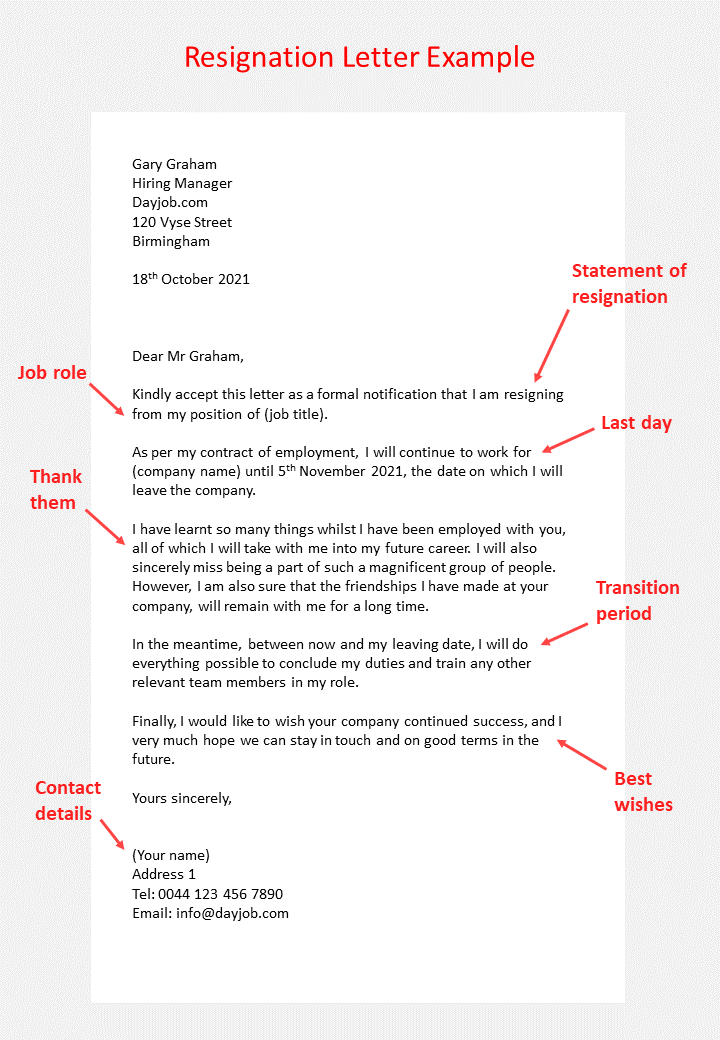Leaving is never easy.
But if you’re going then it’s best to leave on good terms.
Not sure how to do this?
You’ve come to the right place, on this page find dozens of professionally written resignation letters and advice on;
- How to write a resignation letter
- When to hand in your letter
- Things to do before you leave

Resignation letter example 1
Contact name
Position
Company name
Address 1
Address 2
Address 3
Date: 8th December 2021
Dear …………,
Please accept this letter as a formal notification that I intent to resign from my position as receptionist from ………… (employers name).
As is required by my contract I am giving you thirty days notice ahead of my intended leaving date, which is the 8th January 2022. Could you please confirm to me any holiday entitlement that has not yet been taken.
I would also like to state that I have greatly enjoyed working for the company and have appreciated the support that you have provided me during my employment.
Before I leave, I am more than happy to meet with you to discuss the reassignment of my work and to assist in any way during the transition period.
I wish you and the company good luck and continued success.
Yours sincerely,
Your name
Address 1
Address 2
Email:
Phone number:
Resignation letter example 2
Contact name
Position
Company name
Address 1
Address 2
Address 3
Date: 20th December 2021
Dear …………,
I am writing to tender my resignation from my position of ………………. with effect from 31st January 2022.
I feel that the time is right for me to move on in my career. I am leaving to take up a new position which will enable me to further my career and achieve my potential. I would be grateful if you could confirm receipt of my notification and of my leaving date.
If there is anything, I can do to ensure a smooth transition period then please let me know.
May I take this opportunity to thank you and the …………….. team for the support and opportunities I have received during the course of my employment.
I wish you, your team and the company nothing but success for the future.
Yours sincerely,
Your name
Address 1
Address 2
Email:
Phone number:
RELATED: Reasons why people leave their jobs
Resignation letter template 1

When to give a reason for leaving
People resign for various reasons, with many preferring not to explain why and writing a letter that simply states they’re going.
However, some people want to give a reason.
- POSITIVE REASONS – If you are leaving because you are relocating or going back to education etc then it’s OK to mention these.
- GREIVANCE – If you are leaving because of a grievance then it’s best NOT to give details.

How to write a resignation letter
1. State that you are resigning.
2. Mention the role you are resigning from.
3. Give the date you intend to leave (last day).
4. Thank your manager for their support at work.
5. Offer to help during the transition period.
6. Finish with a ‘Yours sincerely’ and signature
7. List your contact details, personal email and phone.

Tips on writing a resignation letter
Writing a tactful resignation letter is not easy.
As it is a matter of formality it needs to be done skilfully and in a way that does not upset you soon to be ex-employer.
The below guidance will show you how to resign from a job easily and quickly by keeping your letter to the point and avoiding any room for misinterpretation.
Avoid criticising previous employers
Once you have made the decision to move on, it serves little purpose to criticise your employer or your job.
Addressing a resignation letter
As it is a personal document, and you will probably know your bosses first name you can start it off with a something like;
- ‘Dear Richard’.
Be tactful
Many employers do take a personal interest in their staff and can see it as a personal failure if a valued member of staff wants to leave.
Therefore, focus on writing a document which your employer can hold in their hand and feel absolved of any blame or fault over your departure.
Check your company’s termination policy
As some employers require a minimum of 4 weeks’ notice for employee resignations.
Be sure to mention this period in the letter.
Give as much notice as possible
Try to give your employer as much notice as possible, so they can have a reasonable amount of time in finding a replacement for you.
Be upbeat
Try to soften the blow of your departure by including positive points in your letter.
RELATED: How to write a resignation letter
What is a resignation letter?
A resignation letter is a formal statement advising an employer that you are leaving your job.
Even when oral notification of your intentions has been given it is still a requirement to put it in writing.
Why is a good resignation letter important?
A well written resignation letter can keep bridges from being burned between you and your company.
This is important if you:
- Need an employment reference from them later on.
- Apply for a job with the same employer in the future, it can happen!
Also remember that your letter will almost certainly be archived and included in your employment file.
What not to put in a resignation letter
Criticize
Your employer, colleagues or job.
Become emotional
Refrain from using over friendly, sentimental or aggressive language. Remember this is a legal and official document.
Be negative
This should be avoided, it can leave a bad baste in the mouth and sour any relationship.
- Remember, you may in the future end up applying for a job with the very same company.
Put down colleagues
Avoid disparaging remarks about individual managers, co-workers, or subordinates.
Go on and on…
Never give lengthy explanations about why you are resigning i.e:
- How you were offered more money elsewhere.
- Sob stories about how you had no option but to go.
Give a reason for leaving
There is no need to do this (however, if you feel the need to, then make it brief).
Things to do before you leave
Clean up
Your desk, locker, bin, laptop and computer.
Delete
All personal computer files, your browsing history and emails.
Keeping in touch
If you want to stay in touch with any colleagues then take their contact details or give yours to them.
Reference – ask for it before you go
You may want to consider politely asking for a reference from your employers before you leave.
Finish tasks
Make sure you tie up any loose ends and do not leave any important tasks or duties unfinished.
Saying goodbye to co-workers
After handing in your notice it’s polite to let your close work colleagues know that you are leaving.
Don’t boast
Its also advisable to not boast about any new job you are taking up.
Exit interview
There’s a chance you may be asked to attend an exit interview, so it’s worth while preparing answers for the questions you’re likely to be asked.
RELATED: Exit interview questions
Offer to help your employer during the ‘transition period’ before you leave by:
- Training up a fellow worker in your job role.
- Finding someone to replace you permanently.
- Suggesting a fellow member of staff who could do your job temporarily.
Remember that even if your offer of assistance isn’t accepted it will still be appreciated.
When to hand in your letter

The usual way to proceed is to first resign verbally and in person, and to then follow that up with a formal letter.
The letter is commonly handed in at least two weeks prior to a leaving date, this time period allows the employer to make arrangements for your departure.
Although you should note that some companies have different policies and may release an employee immediately, its therefore advisable to check the terms of your employment to see if there are any special clauses.
WARNING – You may be told to leave immediately
Bear in mind that the minute you submit your resignation letter, you could be told to pack your stuff and get out straight away or by the end of the day.
This is why it may be a good idea to save your personal files and have the things you want to take with you ready, before you even tell anyone your leaving.
Alternatives to a resignation letter
The substitute for a letter is an email.
It is an acceptable way of quitting, and favoured by people who need to inform their employers ASAP or who are not able to physically meet their immediate employers due to distance etc.
Like its opposite number, resigning by email has to be done thoughtfully and in a way that doesn’t offend your soon to be ex-employer.
RELATED: Constructive dismissal

